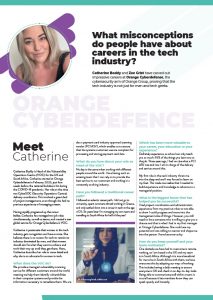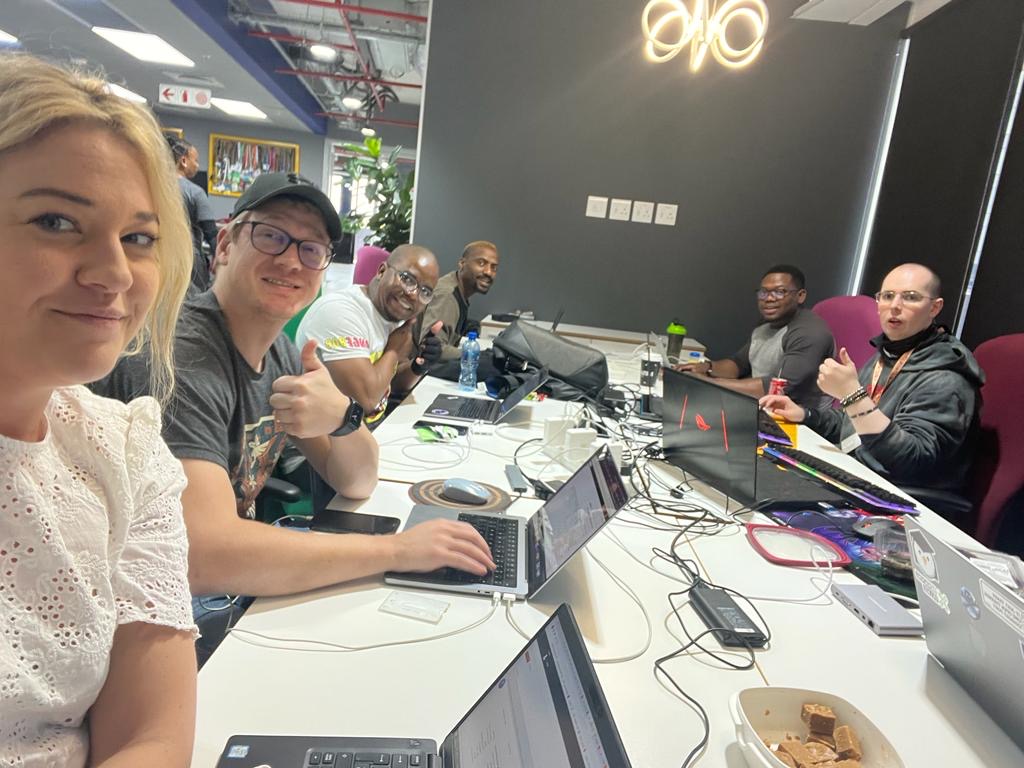What misconceptions do people have about careers in the tech industry?
Catherine Boddy and Zoe Grist have carved out impressive careers at Orange Cyberdefense, the cybersecurity arm of Orange Group, proving that the tech industry is not just for men and tech geeks.
Meet Catherine

Catherine Boddy is Head of the Vulnerability Operations Centre (VOC) for the UK and South Africa. Catherine started at Orange Cyberdefense in February 2020, just four weeks before the national lockdown hit during the COVID-19 pandemic. Her role at the time was CyberSOC (Security Operations Centre) delivery coordinator. This involved a great deal of project management, even though she had no previous experience of managing a team.
Having rapidly progressed up the career ladder, Catherine has managed two job roles simultaneously, as well as teams, and created a new global service for Orange Cyberdefense’s VOC. Catherine is passionate that women in the tech industry gain recognition and have a voice. She believes there is no reason for tech to remain an industry dominated by men, and that women should aim for what they want to achieve and work their way up until they get there. Here, Catherine describes her role in more detail and why she is an advocate for women in tech.
What does the VOC do?
We provide a managed vulnerability scanning service for different customers around the world, meaning we help them identify vulnerabilities in their computer systems and provide the information necessary to remediate them. We are also a payment card industry approved scanning vendor (PCI ASV), which enables us to ensure that the systems customers use are compliant for processing and storing payment card data.
What do you love about your role as Head of the VOC?
No day is the same when working with different people around the world. I love having such an amazing team that I can rely on to provide the best service to our customers and working in a constantly evolving industry.
Have you followed a traditional career path?
I followed an eclectic career path. I did not go to university, spent summers abroad working in Greece, and only settled down into a career in tech at the age of 25. Six years later I’m managing my own team and travelling to South Africa for half of the year!
Which has been more valuable to your career, your education or your experience?
Definitely experience, as school can only teach you so much: 95% of the things you learn are on the job. Three years ago, I had no clue what a PCI ASV was and now I am in charge of the delivery and service around this. My first role in the tech industry threw me into the deep end and I was forced to learn on my feet. This made me realise that I needed to build experience and knowledge to advance to a managerial position.
What is the biggest factor that has helped you be successful?
I had project coordination and administration experience from my previous roles so was able to show I could progress and move into the management side of things. However, you still need to have someone who is willing to give you a chance and that is what I had in my first manager at Orange Cyberdefense. She could see my potential and was willing to mentor and shape me into the person I have become today.
How do you keep yourself and your team motivated?
One obstacle we have had to overcome is remote working, as I am based in the UK and my team is in South Africa. Although it is more beneficial for me to be in South Africa with them, we have overcome this by adapting our ways of working. This includes having a daily meeting to ensure everyone is OK and check in on day-to-day tasks. Being able to communicate well within a team is crucial because it lets members know they can speak openly and honestly.
Why are you a passionate advocate for women in tech?
When working in an industry dominated by men, women’s achievements sometimes go unrecognised. This is why the different awards and recognition that have been created for women in tech are so important as they show how much the industry has advanced. Lots of women are now in positions that were previously dominated by men.
As women, we often need to prove ourselves more than men in the same role, so to be able to help other women break into industry, in the same way I was supported, is a good opportunity to give back and empower women.
What are some misconceptions people have about a career in tech?
- It is mainly an industry dominated by men, and women struggle to break into a career in tech.
- You need to be technical and have good technical knowledge in order to work in industry.
- People in tech work 24/7 and spend all their time behind a computer screen without a social life. In fact, I met some my closest friends from working together in the tech industry.
Who do you look up to for inspiration?
When I started in the tech industry, Reshma Saujani had just done a TED talk. She inspired me to believe that one day I could be the CEO of a company and hopefully make a difference in the industry, like she has done with Girls Who Code.
What are your top three insider tips for a career in tech?
- There are so many different areas within the tech industry. Find the one you are passionate about to enjoy the job you do.
- The tech industry is constantly evolving and changing. It is a fantastic industry for anyone who enjoys learning new things.
- Build relationships with your colleagues. Being able to bounce ideas around and help each other out is a big part of any role.
Meet Zoe

Zoe Grist is the head of the Security Operations Centre (SOC) in the UK. Zoe studied criminology at university and, after graduating, started working for the police force. In 2018, she joined Orange Cyberdefense as a junior service delivery manager, a role that combined her passion for cybersecurity with her history of customer service roles.
After becoming more involved in daily SOC processes and developing her knowledge of the industry, she sought a position with more responsibility. She took on a SOC support manager role, which in turn led to a promotion to head of SOC. Zoe currently manages all aspects of the daily operations and management of Orange Cyberdefense’s UK SOC. This includes heading up a team of technical engineers who provide specialist support, monitoring and security management to customers. She achieved this at the age of 28, after just four years in the industry. Here, Zoe explains what she loves about her role and how she found her passion for cybersecurity.
What does the SOC do?
The SOC is a team of 32 engineers based in the UK and Mauritius, responsible for delivering managed security services to customers to protect their digital infrastructure. As cybersecurity experts, we focus on providing proactive value added support to our customers with the aim of unburdening them from the IT security challenges that businesses face today.
Can you describe some of the things you love about your role as Head of SOC?
First of all, it is the diversity – no two days are the same. Each day there is a different challenge that needs to be tackled. I also love being part of, and having impact on, a global organisation. My role has enabled me to travel to different countries, meet like minded people and support my team of engineers to succeed in their own careers.
Why did you study criminology?
I decided to study criminology at Southampton Solent University because of my interest in the criminal mind and pursuit of a career within the police force. I wanted to get a broader understanding of ‘what makes people tick’. The course itself captured my interest due to the diverse range of topics being taught by industry leading experts.
How did you become interested in cyberterrorism?
My interest in this topic developed in my final year when I selected an additional module to learn about cyberterrorism. From there, I decided to write my dissertation around the existing argument of old versus new terrorism, with the aim of analysing what cyberterrorism actually is/was (back then) and how the ‘cyber’ dimension adds a somewhat new perspective to the debate. Having recently re-read my dissertation, I’ve realised how much has changed since writing it in 2014 and how quickly the cyberterrorism landscape can evolve!
What did you learn from your experience working with Kent Police?
I thought landing my dream job as a police officer was the end goal for me. I enjoyed the job overall but struggled with the work life balance. I had worked so hard throughout school, sixth form and university to get to where I was, but things did not end up the way I had envisioned. Making the decision to leave the police to pursue a different career path was one of the hardest but best decisions I have ever made. It taught me that, no matter what, life is too short to spend it doing something that makes you unhappy. You can change your mind on the career you want at any age. Just because you seem to be heading in one direction does not mean you have to stay on that path; some things might work out and others might not.
What transferable skills do you have that have helped you get to where you are today?
The main skills that have allowed me to get to where I am today are interpersonal and communication skills, and having a good work ethic, drive and grit. None of these skills has anything to do with directly working in cybersecurity, but with the right foundations you can truly pursue any career or goal you want.
What is the biggest factor that has helped you be successful?
Truly understanding what I am passionate about has allowed me to consistently deliver in the variety of roles I held previously. This, combined with surrounding myself with the right people, and having the drive and perseverance to succeed, has meant that I have been able to overcome any challenges that have come my way.
If you could start all over again, what would you do differently?
Nothing comes to mind – because if I were to change anything I would not be where I am today. All the challenges along the way were lessons learnt and experience gained.
What are your top three insider tips for a career in cybersecurity?
- You do not have to do things in the traditional sense, such as school, college or university. Real life experience is just as valuable.
- It is more important to find your passion and what motivates you. If you find yourself interested in cybersecurity, then identifying this will help you in whatever specific job role you wish to do.
- The cybersecurity industry is constantly evolving. You need to be willing to learn every day, develop your skills and adapt to change quickly.
About Orange Cyberdefense
Orange Cyberdefense is a part of Orange Group and provides cybersecurity services to organisations all over the world.
Discover more about Orange Cyberdefense
Twitter: orangecyberdef


